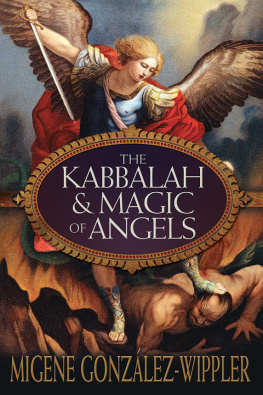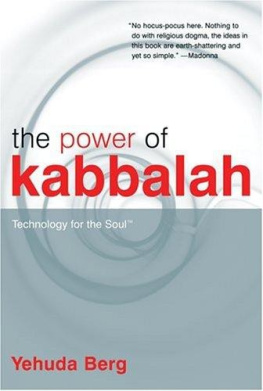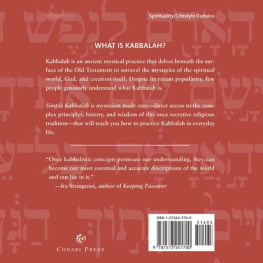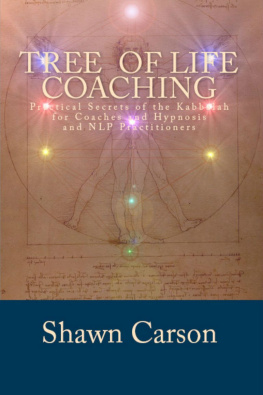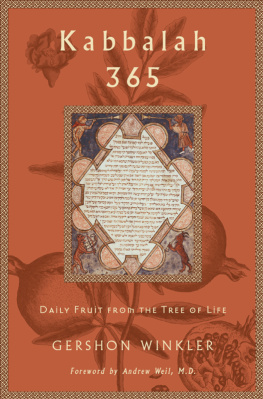Copyright 2013. All rights reserved worldwide.
No part of this publication may be replicated, redistributed, or given away in any form without the prior written consent of the author/publisher.
What Is The Kabbalah?

The Kabbalah (or Qabbalah) is an ancient Hebrew system of spiritual development designed to help you to understand the universe. It is based on the tree of life, which both explains the universe and leads you to enlightenment.
The Kabbalah is based around the concept of the Tree of Life (see illustration). This consists of ten sefirot (the singular is sefirah and sometimes spelt sephirah) which are junctions on the tree of life. There is an 11 th , which is a hidden sefirah, known as Daath (Westernized) or Daat (Hebrew). Dont worry, these will all be explained in a later chapter.
The journey through the Kabbalah consists of moving from sefirah to sefirah along the pathways. Journeying from the bottom of the tree of life to the top represents the journey of spiritual enlightenment. The various pathways and symbols along the journey represent spiritual transformations but can also be used in Ceremonial and High Magic, as well as in Kabbalistic Magic.
The Kabbalah can be used as a model for life and for the universe around you, being applicable to almost everything that you can think of. Through Kabbalah we seek to define the nature of the universe, human existence and our purpose for being here.
In order to understand the Kabbalah you have to realize that it is about losing yourself and becoming one with the universe rather than a me centered, ego based system.
The word Kabbalah, when translated literally, means that which is received and in order to receive you must first be receptive, creating a vessel in yourself with which to absorb the information that is the Kabbalah and to grasp the concepts of the tree of life.
Whilst the Kabbalah was the secret of the Jewish Rabbis for many years, with the massive interest in spirituality in Victorian England, it soon filtered west where it was taught in Ceremonial Magic and became of interest as a system of spiritual enlightenment.
In general, Kabbalah is split into three separate categories:
- 1) Theoretical this is mainly concerned with the inner dimensions of reality.
- 2) Spiritual Worlds including souls, angels, meditation and more. The goal here is to teach the student to reach a high level of consciousness and to even experience prophecy through connecting with the Divine.
- 3) Magical this is all about influencing the course of nature using amulets, seals, incantations, the names of God and other mystical exercises.
The magical side of Kabbalah is probably one of the reasons it is well known in the west, with people like Dion Fortune and Alistair Crowley promoting Kabbalah as a system of enlightenment and magic. It is a system that can take a lifetime or longer to master and harbors great power.
One of the great masters of magical Kabbalah was Rabbi Joseph Della Reina (1418-1472). According to legend he tried to use his spiritual powers to bring on the ultimate redemption and injured himself spiritually. What happened to him remains the subject of legends, with some saying he went mad, others saying he committed suicide and yet others saying he was transmogrified into a spiritual being.
Whatever may have been the case, the generations after him stopped practising the magical side of Kabbalah and the knowledge died out. The resurrected knowledge from the Victorian spiritualists isnt entirely based on Jewish tradition, with much of it being modern interpretations of this ancient knowledge.
The meditative side of Kabbalah has never really taken off, though with the creation of the Kabbalistic centres in the west (symbolized by the wearing of a red thread around the wrist and popularized by celebrities such as Madonna) it has become more popular today as people seek meaning in their life. Meditating on the Kabbalah can lead to inner peace and spiritual enlightenment, assisting you to achieve a heightened state of consciousness.
Many of the works produced about the Kabbalah have been based on the theoretical aspect of it. The main body of work on theoretical Kabbalah is the Zohar, which are the teachings of a Talmudic mystic by the name of Rabbi Shimon Bar Yoachai who lived in the second century after Christ. His teachings were handed down by word of mouth until they were finally published towards the end of the 13 th century by Rabbi Moshe De Leon.
Historically, the study of theoretical Kabbalah can be split into three eras:
- 1) The Publication Of The Zohar the early teachings of the Kabbalah
- 2) The 16 th Century the mystics at this time (many from the city of Safed) did a lot of work with the Kabbalah creating what is called now the great Kabbalistic renaissance.
- 3) The Chassidic movement founded by Baal Shem Tov (1698 to 1760) this had a major effect upon mystical movements at the time and still does, indirectly, today.
To those who do not know the Kabbalah well, it seems a strange and fantastical diagram which has no bearing on reality. Once you start to delve into the Kabbalah though you will slowly start to realize that this is a deep subject that even after a lifetime you may well not have mastered.
The Kabbalah is a very misunderstood system, with one of most common misconceptions being that studying it will give you psychic powers. The purpose behind studying the Kabbalah is to help you improve your Self and for you to become more attuned with the universe. For those who wish to receive it, the study of Kabbalah brings spiritual enlightenment and oneness with God.
For many people the study of Kabbalah becomes a labor of a lifetime; it can become an obsession when you realize how deep and meaningful it is. With thousands of years of history, studying and tradition, there are huge amounts of information available about the Kabbalah and how you can use it to transform yourself and your life.
Studying the Kabbalah isnt just about reading a book. It is also about living the Kabbalistic principles and living the Kabbalah and its teachings on a day to day basis. To not do so would be like trying to experience love by reading a book about it. You can become an expert on the literature, but unless you live it you will never truly know what it is like.
Not living the Kabbalah when you study it is like trying to understand a city by looking at a map. If you dont visit the city, explore it and feel the pulse of it, then you will never truly understand it. Kabbalah is much the same way; you have to live it to feel its pulse and to understand it.
Much of the literature available on the Kabbalah is not about the transformation of the Self; much of it is about the theory and understanding of the Kabbalistic Tree of Life. Much of the Chassidic literature is about taking this theory and applying it to your day to day life through a deeper understanding of the heavenly pathways and spheres.
Unlike many systems of self-improvement, the Kabbalah doesnt brush negativity or negative traits under the carpet. It condemns them and recognizes they exist, but one does not give in to them. Instead the approach is quite different and you do not battle negativity and nor do you overwhelm it with positivity.


